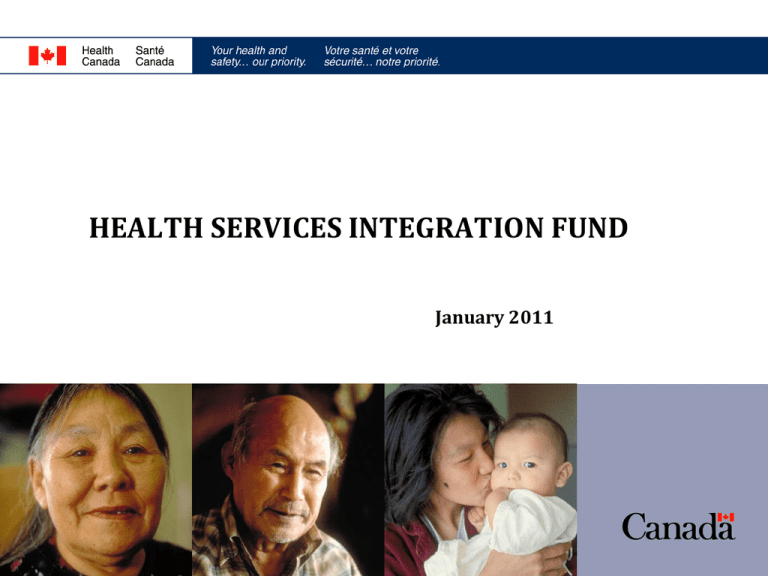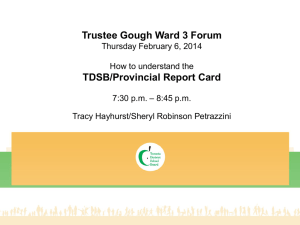HSIF Tool Kit
advertisement

HEALTH SERVICES INTEGRATION FUND January 2011 Health Services Integration Fund (HSIF) PURPOSE: To provide you with information regarding HSIF to help you in developing HSIF funding proposals for health service integration partnerships to advance the integration of First Nations health services. 2 Health Services Integration Fund (HSIF) Contents: • What is HSIF? • Potential partnership activities that could be funded by HSIF • Recommended Resources • What HSIF is NOT • HSIF and AHTF • What are the AHTF Lessons Learned? • How HSIF works • HSIF Budget Ontario Region: 2011-2015 3 Health Services Integration Fund (HSIF) What is HSIF? Health Canada’s National Health Services Integration Fund is a five year, $80M initiative intended to support collaborative planning among First Nations communities/organizations, provincial ministries/agencies and Health Canada through multi-year projects aimed at better meeting the health care needs of First Nations and Inuit. First Nations & Inuit Health Ontario Region’s (FNIH OR) funding allocation is $7,482,339 to March 2015. 4 Health Services Integration Fund (HSIF) • • • • HSIF objectives: Improve the integration of federally and provincially funded health services; Build multi-party partnerships to advance the integration of health services that are better suited to the health needs of First Nations peoples; Improve access to health services; Improve the participation of First Nations peoples in the design, delivery and evaluation of health programs and services; 5 Health Services Integration Fund (HSIF) • HSIF is intended to strengthen existing FN health services by building on the federal-provincial and FN partnerships established under AHTF or other initiatives. • Existing health services and funding authorities will not be impacted by HSIF integration projects. • HSIF projects are those that involve more than one community and/or the integration of more than one health service. 6 Health Services Integration Fund (HSIF) Potential health service partnership activities that could be funded by HSIF (p.10, HSIF Guide): -Implementation planning and support; -Program Delivery; -Aligned Policies and Procedures; -Change Management Activities; -Communication and Reporting; -Partnership Development & Stakeholder Engagement; -Evaluation Activities; -Development & Implementation of common policies, procedures for integrated health services delivery; 7 Health Services Integration Fund (HSIF) Potential health service partnership activities that could be funded by HSIF (Cont’d)): -Complementary federal and provincial public health protocols to support rapid prevention of threat of infectious disease -Integration of health services being provided by FN funded by the federal government with provincial health systems; -Integration of governance structures to ensure active participation of FN in the design and planning of health services; -High-level tripartite planning and preparation of potential tripartite agreements; -Projects that support current high-level tripartite discussions. 8 Health Services Integration Fund (HSIF) Recommended Resources: • The HSIF Implementation Guide “A Toolkit for Integration Projects” is designed to help all partners. The Guide elaborates on governance structures, HSIF projects, criteria for funding, sample templates, logic model, etc. • Key resource documents accessible via http//ourtimeourhealth.ca , http://www.lhins.on.ca • Health Canada: HSIF http://www.hc-sc.gc.ca/fniahspnia/services/acces/index-eng.php AHTF Outcomes & Lessons Learned http://www.hc-sc.gc.ca/fniah-spnia/services/acces/oll-rlr-eng.php 9 Health Services Integration Fund (HSIF) What HSIF is NOT: • HSIF is not a renewal of AHTF or a roll over of funding to support the continuation of AHTF activities. • HSIF is not for the creation of new services or for projects with weak links to health services • HSIF funding is not for all First Nation communities • HSIF is not community based funding. • HSIF is not a source of funds for individual communities, community programs, e-health infrastructure, permanent staff or service contracts to sustain HSIF beyond 2015. 10 Health Services Integration Fund (HSIF) HSIF will not fund (p.11, Guide): • • • • • Capital projects E-health infrastructure Permanent staff Service Contracts Service fees extending beyond HSIF i.e. 2014-2015. 11 Health Services Integration Fund (HSIF) HSIF and AHTF Unlike HSIF, AHTF had 3 funding envelopes: • Adaptation supported provincial governments in adaptation of provincial health systems to better meet unique needs of Aboriginal peoples; • Integration – supported the integration of provincial health systems with federally funded systems; • Pan Canadian – supported cross-jurisdictional integration and adaptation initiatives. 12 Health Services Integration Fund (HSIF) • 2004-2011, AHTF supported FNI communities in identifying and implementing projects that promoted the integration of federally-funded health services within First Nation and Inuit communities, with those funded by provincial governments. • AHTF also supported provinces in adapting their health services to better meet the needs of Aboriginal Canadians. 13 Health Services Integration Fund (HSIF) • Eleven Ontario AHTF integration projects focussed on: Continuum of care, Substance abuse, tripartite FN public health relationship framework, e-health, physicians services, tripartite FN health promotion strategy, FN strategic health plan, FN capacity building, federal and provincial hospital integration. • March 31, 2011, AHTF Integration Projects Evaluation Report & Case Studies identified lessons learned. • Accessible via: http//ourtimeourhealth.ca, http://www.lhins.on.ca, http://www.hc-sc.gc.ca/fniahspnia/services/acces/oll-rlr-eng.php 14 Health Services Integration Fund (HSIF) • The investments of AHTF provide a foundation upon which to build a more integrated health system for First Nations people. • HSIF will capitalize on the lessons learned and partnerships established among First Nations, provincial and federal representatives under AHTF. HSIF is not intended to sustain previous AHTF projects. 15 Health Services Integration Fund (HSIF) AHTF Lessons Learned : • Need more support in project planning, implementation • Hire staff early with funding specifically for leading project integration work • Need collaboration training when there is no prior history of collaboration among players • Partner training on FN culture, social determinants of health • Community engagement • Partners with decision making mandate & commitment to full participation 16 Health Services Integration Fund (HSIF) AHTF Lessons Learned (cont’d): • Provide project management and evaluation training • Signed agreements with stakeholder governments & service providers (e.g. MOUs, with clear roles and responsibilities) increases success of forming effective, sustainable partnerships • Capacity building should focus on the organization so staff turnover does not affect increased competence • Allow time/resources : negotiations when there are or may be conflicting vested interests, actual service integration vs planning for integration 17 Health Services Integration Fund (HSIF) AHTF Lessons Learned (cont’d) • Address challenges: inadequate preparation of project staff, partner representatives, staff turnover, conflicting interests within service partnerships, funding delays, travel challenges • Success was best with transparent processes, all stakeholders at table consistently, open & respectful dialogue • Establish health integration advisory committees • Include net effect changes in project evaluation. 18 Health Services Integration Fund (HSIF) AHTF Lessons Learned (Cont’d) • Identify community priorities/health needs/health service gaps; • Include integration of administrative functions within service integration 19 Health Services Integration Fund (HSIF) KEY HSIF STEPS AND STAGES • Ontario HSIF Advisory Committee comprising First Nation, provincial and federal representatives is responsible for planning, implementing and evaluating HSIF activities to further the integration of health services works collaboratively to improve the integration and coordination of federally and provincially funded health services in order to promote health and improve health outcomes for First Nations peoples living in Ontario • The Advisory Committee Terms of Reference is accessible via http//ourtimeourhealth.ca and http://www.lhins.on.ca 20 Health Services Integration Fund (HSIF) KEY HSIF STEPS AND STAGES • The HSIF Advisory Committee will guide the establishment of multi-year integration projects (broader than scope and reach than many funded under AHTF) aimed at improving service integration and access to existing provincial and federal health services to better meet the health care needs of First Nations people in Ontario. • Ontario HSIF Integration Plan, developed by the Advisory Committee , accessible on the previously mentioned websites. 21 Health Services Integration Fund (HSIF) • The Advisory Committee’s Terms of Reference and the Integration Plan received FNIHB ADM approval, criteria for funding eligibility. • HC FNIH OR sits on the Advisory Committee , works with partners the implementation of the Integration Plan, manages HSIF finances and provides oversight of reporting requirements. • HC FNIHB is responsible for overall HSIF management, financial oversight and accountability. 22 Health Services Integration Fund (HSIF) SOLICITION OF PROJECTS • Letters Of Intent The Advisory Committee will issue a request for a letter of intent (LOI) to identify community interest and readiness to implement an integration project beginning 2012-13 and ending March 2015. • The LOI will identify specific criteria to help potential applicants prepare the formal LOI for submission. • The Advisory Committee will rate the LOIs based on the following criteria: 23 Health Services Integration Fund (HSIF) *Project aims to improve the integration of health service delivery in FN communities and access to local health services (including off territory) *Name of staff lead responsible for proposal development if LOI is approved *Indication of capacity to manage project *Eligibility for federal funding per financial policies *Indication that project builds on AHTF lessons learned or other evidence informed partnership initiatives relevant to HSIF *Indication that project is not a continuation of previous AHTF activity *Demonstration that proposed project meets HSIF objectives *Indication of active involvement and engagement of a number of FN communities along with provincial and federal partners and agencies *Alignment with any of the four priorities in the Integration Plan or other FN evidence based health priorities *Inclusion of project evaluation, sustainability plan; multi-year requests <$850,000 24 Health Services Integration Fund (HSIF) • The Advisory Committee will review and recommend successful Letters Of Intent (LOIs) to Health Canada • Upon HC approval, the Advisory Committee will announce which LOIs will be supported for funding to develop and submit full proposals. • Successful LOIs are not guarantees of HSIF project funding. • Successful LOI applicants will submit fully developed proposals to Health Canada for review by the Advisory Committee and Health Canada review/funding approval. 25 Health Services Integration Fund (HSIF) SOLICITATION OF PROJECTS: Request For Proposals • A separate Request for Proposals will be issued in Feb.2012 • A deadline for all HSIF proposals will be set • The Advisory Committee will recommend proposals to Health Canada for approval • Contribution Agreement processes will be initiated for HC approved proposals. • The HC HSIF Proposal Assessment Criteria will comprise the following: 26 Health Services Integration Fund (HSIF) Project aims to improve continuity of health services in FN communities, linkages between services and/or access to other local health services Identification of staff/lead responsible for implementing the health integration work Indication of Capacity to manage/coordinate project –infrastructure, space, staffing Eligibility for federal funding per financial policies Indication that project builds on AHTF lessons learned or other evidence informed partnership initiatives relevant to HSIF Indication that project is not a continuation of previous AHTF activity Demonstration that project meets HSIF objectives Indication of active involvement and engagement of a number of FN communities along with provincial and federal partners and agencies 27 Health Services Integration Fund (HSIF) Alignment with any of the four priorities in the Integration Plan or other FN evidence-based health priorities such as Suicide, Palliative Care as evidenced by BCR, etc. Letters of support from partners indicating working relationship and commitment Evaluation Plan that includes steps to monitor and measure project outcomes related to HSIF objectives and logic model and the improvement of FN health outcomes. Sustainability Plan that includes steps for sustaining the project beyond HSIF without new funding, through re-profiling of existing resources. Successful prior health service integration partnerships with FN, federal and provincial representatives 28 Health Services Integration Fund (HSIF) RFP assessment criteria (Cont’d) Specific communities, federal and provincial partners, health services are identified for proposed health service continuity, linkages between services and/or access to other local health services Workplan builds logically and demonstrates clearly activities, deliverables, expected results, budget, timeframe Budget contains only eligible costs In-kind support is identified and included in overall budget Budget includes project coordinator Steps to develop a Communication Plan are included. 29 Health Services Integration Fund (HSIF) FUNDING POTENTIALLY *AVAILABLE Category 20112012 2012-2013 2013-2014 2014-2015 TOTAL Grants& Contribution Agreements $711,186 $1,851,709 $2,319,413 $2,600,033 $7,482,339 First Nations Capacity $100,000 $100,000 $100,000 $100,000 $400,000 Regional Overhead& Maintenance $150,000 $100,000 $100,000 $100,000 $450,000 *Based on recommendation by HSIF Advisory Committee and FNIHB Approvals 30






